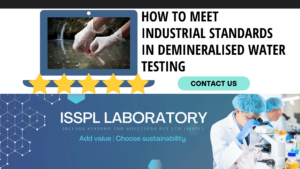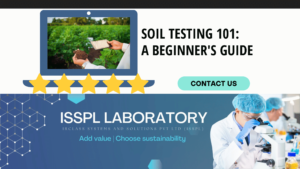An Overview by Team ISSPL - Analytical Testing Laboratory in India
ToggleThe quality of irrigation water is integral for diverse reasons. The quality is essential for the immense impact of the water. It can affect the quantity of crops and crop yields. Hence, it is essential to maintain soil productivity and help safeguard the environment with the best practices. Poor irrigation water quality, especially in areas with salt-affected sources, can boost the process of soil degradation. As a result, it can induce crop stress, and reduce the crop yield.
Essential quality parameters – Water testing for irrigation
The irrigation water quality can vary from crop to crop. The quality varies depending on the crop’s tolerance and resistivity quality against chemicals and minerals. Apart from checking the minerals, one must check the location-wise difference in the irrigation water quality. It differs extensively from region to region, and it is critical to review the differences. The quality is dependent on diverse aspects like – the groundwater extraction process, the intensity of local rainfall, etc.
The chemical features that define the quality of irrigation water are –
- Alkalinity
- Hardness
- Mineral concentration
- pH
- Salinity
- SAR – Sodium Adsorption Ratio
Does the source make a difference?
The prime sources of water for irrigation include – groundwater and surface water. Groundwater exists in subterranean aquifers and the surface water exists above ground. It also includes freshwater that goes into lakes, rivers, streams, and wetlands. Groundwater sources are – rain and melted snow that sieves through the soil and reaches the bedrock.
The melted snow settles between cavities and fractures in the rock bottom. A maximum percentage of groundwater is present within half a mile down from the Earth’s surface. The mineral salts in naturally sourced water include –
Bicarbonate, Boron, Nitrate, Potassium, Sodium, Calcium Chloride, Fluoride, Iron, Magnesium, and Sulphate.
The need to test the water – Know it rightly.
Water quality is critical for crops grown in any amount. Greenhouse and high tunnel growth environments have a significant impact on the water quality. Why? Because irrigation is the exclusive source of water for such cases. Crops grown outside the closed environment do not depend exclusively on irrigation water sources. Why? Because these crops get natural water and experience dilution from rainfall.
In both cases, water testing is an integral step while considering irrigation water for crop yield. It is critical to ensure maximized crop yield. Otherwise, the results could be disastrous, increasing the plant toxicity to the next level.
All irrigation water sources need to undergo a thorough examination and must be tested for – pH factor, alkalinity, conductivity, hardness, chloride, and sodium salts.
The irrigation water can also contain –
TDS or total dissolved solids, boron, calcium, ammonium-nitrogen, phosphorus, potassium, sulfur, iron, manganese, copper, molybdenum, magnesium, sodium adsorption ratio (SAR), nitrate-nitrogen, and zinc.
Understanding the essentiality of pH level
The pH of water is an essential factor, in determining crop growth rate and quality. It gets measured on a measuring scale of 0 to 14. A pH value of 7.0 determines the neutrality of water. In contrast, a pH value below 7.0 makes the water acidic. The pH value above 7.0 makes the water basic. It is essential because the pH value of water determines the alkalinity effects. It is significant for the solubility and availability of nutrients in the water. All these make the soil quality different and thus impact the crop.
Most crops prefer slightly acidic conditions in the water and soil humidity. It must be within a pH range of 5.0 to 7.0. There may be problems in the water if the pH value is too low or high. A high pH value of more than 7.0 level can reduce the presence of various metals and micronutrients in the soil. It causes deficiency symptoms for the crops.
High alkalinity is a critical pH issue and can be corrected with the help of acid injection or acid fertilizer. In contrast, a low pH value of less than 5.0 may result in excessive toxicity. It generates high levels of metals in the soil like – iron and manganese. One can fix the problems of acidic water by using a basic fertilizer or limiting the growing medium.
Know the diverse impacts.
All commercial crop-based industries must invest sufficient resources for testing the soil and irrigation water regularly. It is critical to test the quality of the irrigation source water. The frequency of testing can vary, and it depends on the usage. The analysis must be accurate and requires the assistance of professional testers.
It is ideal to conduct the test at a reputable laboratory and maintain a record of the changes in the water quality. Document the reports to develop a baseline of stability and determine the seasonal changes in water quality. It will help you compare the future reports and make better decisions. The information in the reports can help you realize the potential of the irrigation water supply and determine its influence on –
- Plant health
- Soil health
- Irrigation system longevity
Soil impacts and subsequent plant health impacts
Water can create a remarkable impact on various properties of the soil. It can alter the physical, chemical, and biological properties of the soil and affect plant health. For instance, the irrigation water source with minimal external components (termed “pure water”), may yield the best crop for diverse reasons. It may be high in sodium and can cause the ground base or soils to disperse. Dispersed soil particles tend to settle close to each other.
All these make the soil tight, and it loses the soil permeability and porosity. Also, dispersed soils are prone to becoming compacted. The problems of soil clogging and sealing could make it troublesome to grow crops. It reduces gas exchange and water holding capacity, decreasing the growth of microorganisms that are integral for crop growth. The roots face difficulty penetrating the compacted soil, hampering natural growth. Thus, the soil and irrigation water have a profound impact on the plant health and growth rate.
Water testing – A critical step for overall quality maintenance
Water quality can reduce the efficiency of irrigation systems and affect crop quality. Recognize the impacts of harmful water on the soil and make the best choice by selecting a reliable testing resource.







